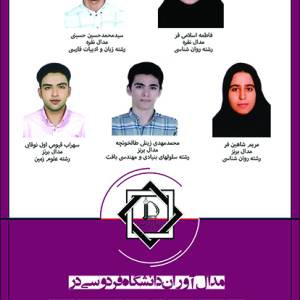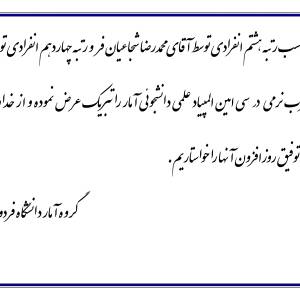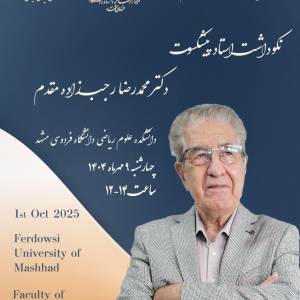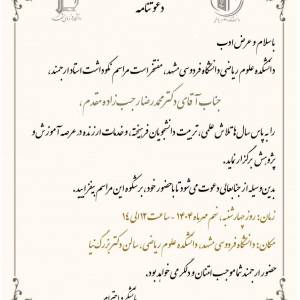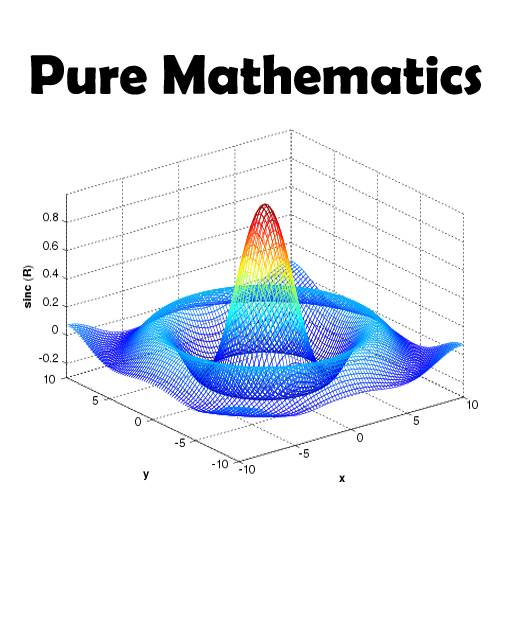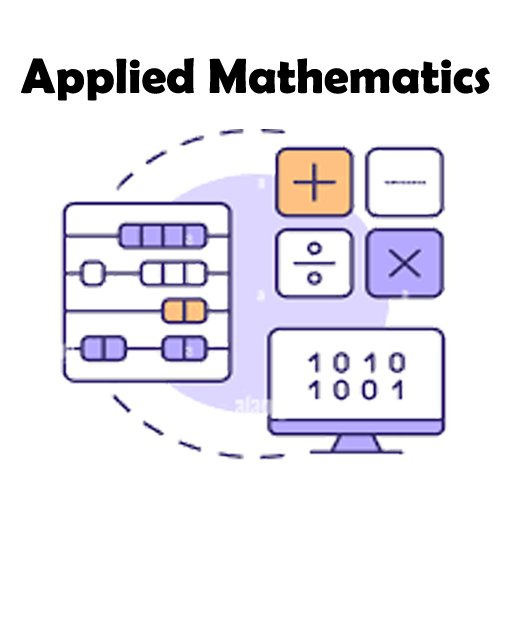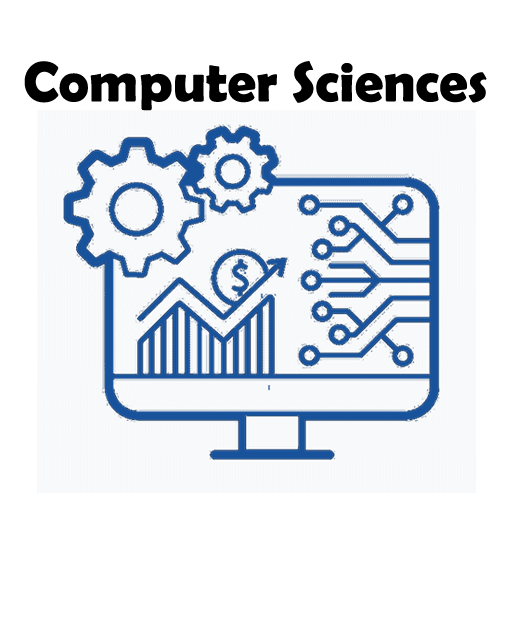- بازدید: 20

Introduction of the DSLab (Data Science Laboratory)
The Data Science laboratory (DSLab) is a research group in the Mathematical Sciences faculty of Ferdowsi University of Mashhad, Iran.
In DSLab, we analyze, model small and large groups of data (Big data), and try to solve society's fundamental problems in different (various) fields.
Our goal is to analyze scientific data.
In fact, in the DSLab, we will develop a series of computational methods, tools, and techniques that require statistical learning to model uncertain phenomena. With the help of mathematics and computer science, these techniques are transformed into computational algorithms for solving real problems.
Research Topics:
1. Information Retrieval and Social Network Analysis
2. Machine Learning
3. Neural Network Analysis
4. High-dimensional and Big Data Analysis
5. Data Mining
6. Dependent Data Modeling
7. Data Visualization and Mathematical Modeling
The Opening of the Data Science Lab
The opening of the DSLab of Mathematical Sciences faculty was held on May 21, 2021, at the same time as "Education Week", in two virtual and in-person ways.
In the beginning, after reciting the Quran, national anthem and introduction video of the Mathematical Sciences faculty, Dr. Soheili, the honorable head of faculty, referred to the faculty policies for launching demanded fields such as data science in the faculty then he announced the launching of this field at the master's level in mathematics faulty and some descriptions about cooperation between DS Lab and Mashhad Urban Observatory.
In the following, Dr. Arashi, who setted up the DS Lab, explained the goal of opening this lab and it's to develop a series of computational methods, tools, and techniques that require statistical learning to modeling the uncertain phenomena. With the help of mathematics and computer science, these techniques are transformed into computational algorithms for solving society real problems.
Creating different database in various fields such as research, training experts, doing social, industrial and economical projects, data science competition, advising and useful courses for data science are other goals of this Lab.
Also, Dr. Arashi thanked the people who cooperated for launching this Lab and its opening and he announced the Lab's Website link : http://dslab.um.ac.ir and introduced the strategic committee, scientific committee and Lab consultants.
After playing a short teaser of introduction in data science, Dr. Mazlom, the post-doc researcher in data science at university of Amsterdam, Netherlands said : in 2013, data science was officially created by 3 big events; creating and developing of Big data, hardware and deep learning.
In the following, Dr. Mazlom explained the DS Lab Of university of Amsterdam the Netherlands and stated two important objectives of this Lab, which are: academic ; solving scientific problems and commercial ; solving real problems in business and creating value added from unrefined (unformed) data.
He emphasized that if we want to achieve these objectives, it's essential to make relations between DS Lab and different parts of university, organizations like municipality and police, industries like automotive, oil, and steel.
At the end of the ceremony, Data Science Laboratory with the presence of the board and a group of faculty members, Dr. Shakeri Roush, Director General of Statistics, Research and Strategic Studies, Dr. Abbaszadeh, Head of Urban Innovation Center, Mr. Afzali, Head of Urban Data Analysis Center , Mr. Javadi, Head of the Statistical Observations Center of Mashhad Municipality, and Mr. Milani, CEO of Ishia Institute, were inaugurated.
The first meeting of the student team
The first meeting was held on December 10, 2021 at 6 pm in the data science laboratory of the Faculty of Mathematical Sciences, and in this meeting, the following issues were discussed.
1. Requirement to create LinkedIn and Gmail accounts for the laboratory
2. Scheduling students' presence in the laboratory
3. Management of lab website
4. Necessary advertisements for introducing laboratory to professors and public
5. Assistance in holding related workshops
6. Invite professors and professionals to attend ICDS MeetUp programs
The second meeting of the student team
The second student meeting was held on December 20, 2021 at 4 PM in the data science laboratory of the Faculty of Mathematical Sciences, and in this meeting, which took about two hours, the following issues were discussed:
1. The necessary explanations were given for inviting of professors and professionals to attend in ICDS MeetUp programs
2. The next workshop of the laboratory, which is scheduled to be held in February of this year, was reviewed
3. The timing of students' presence in the laboratory was revised due to the addition of other students to the team
4. More advertisements were discussed for introducing laboratory to professors and public
5. The requirement to create a Linkedin account was reminded for each member of the student team and the laboratory
6. The management of laboratory website was discussed again.
The third session of the student team
The third student meeting was held on January 4, 2022 at 4 PM in the data science laboratory of the Faculty of Mathematical Sciences. In this meeting, which lasted about two hours, the following issues were discussed:
1. Changes for lab's home page in website were discussed. Members's LinkedIn accounts were reviewed, and significant tips for lab's account were mentioned.
2. Workshops which be held on next month were discussed and the organizers for workshops were selected.
3. The invitation text for ICDS MeetUps was reviewed and finalized.
It was decided that after receiving the registration link, an inviting email will be sent for the first meeting of the Data Science MeetUp on Wednesday, January 20.
Razavi Quality Institute meeting
The second meeting with the directors of the Razavi Quality Institute was held on Wednesday, January 22, 2014, in the presence of Dr. Arshi, Dr. Tavakoli, Dr. Soleimanifard and Dr. Mazlum.
In this meeting, the macro strategies and ecosystem model of Razavi Quality Institute were introduced in more detail and explanations about the product ranking system were provided by the institute. After questions and answers from the faculty and the institute regarding appropriate ranking models, executive steps and the need to define specific projects, it was decided that the institute will have meetings with the faculty and expert team of faculty to determine initial framework and identifying issues that lead to added values.
Lab Programs
Workshop 1 (Data visualization using R-Part I)
Workshop 2 (Spatial Data visualizition on Static and Dynamic Geographic Maps Using R-Part II)
Workshop 3 (Introduction of how to create web applications using R-SHINY Part 1)
Workshop 4 (Introduction to how to create web applications using R-SHINY Part 2)
Predicting cortical-dependent dementia using deep learning techniques
- بازدید: 242
اعضاي گروه آموزشي علوم كامپيوتر:
1- سركار خانم دكتر سهيلا اشكذري طوسي “سرپرست گروه آموزشي علوم كامپيوتر”
2- جناب آقاي دكتر محمود امين طوسي
3- جناب آقاي دكتر رسول رمضانيان
4- جناب آقاي دكتر سيدهاشم طبسي (مأمور)
5- جناب آقاي دكتر حامد فهيمي
6- جناب آقاي دكتر جلالالدين نصيري
- بازدید: 859
عناوین طرح های پژوهشی موردنیاز موسسه کیفیت رضوی
1- ایجاد پلتفرم
در این پلتفرم شرکتها تاسیس شده یا در شرف تاسیس توسط دانشجویان دانشگاه، کسبوکار خود را متناسب با نیازها و قابلیتهای موجود در زیست بوم طیب تعریف مینمایند. دانشگاه و موسسه نیز متناسب با طرح توجیهی و اقتصادی شرکتها نقش حمایتی خود را ایفا مینمایند و در دستاوردهای علمی و اقتصادی حاصل متناسب با توافقات صورت گرفته سهیم خواهند شد.
2- شتابدهنده طیب
شتابدهنده طیب یک گروه منسجم و مشخصی است که در آن افراد و تیمهای دارای طرح نوآورانه و فناورانه در مسیر شکلگیری، زیست بوم طیب را انتخاب کرده و در یک دوره کوتاه چند ماهه خدماتی از قبیل آموزش، مشاوره، مربیگری و ارتباط با شبکه سرمایهگذاران را دریافت مینمایند. بنابراین هر تیمی که موفق به اتمام دوره شتابدهی شود، تبدیل به شرکتی نوپا در زیستبوم طیب میشود که شتابدهنده به ازای خدماتی که ارائه نموده است، درصدی از سهام آن کسب و کار را از آن خود میکند. با توجه به امکانات زیرساختی مانند فضا، تجهیزات و آزمایشگاهها و همچنین امکانات علمی موجود در دانشگاه فردوسی و دانشکده علوم ریاضی این ظرفیت وجود دارد که دانشجویان، فارغالتحصیلان و اساتید فناور بتوانند در بستر شتابدهنده طیب فعالیت نمایند و همکاری منسجم و مشترک دانشگاه و صنعت را به منظور کسب ثروت توسعه دهند.
3- سامانه رتبه بندی طیب
در سامانه رتبهبندی امکان ارزیابی تعاملی و پویای کیفیت در حوزههای محصولات، خدمات و سازمانها وجود دارد. انتظار میرود دانشکده علوم ریاضی براساس زیرساختهایی که در زمینه آزمایشگاه علم داده، مدلسازی و بهینهسازی سیستمها و Gamefication دارد و همچنین ارتباطات گستردهای که با سایر دانشکدهها دارد پیشنهاداتی را جهت توسعه این سامانه در قالب طرحهای پژوهشی کاربردی ارائه و اجرایی نمایند. در این زمینه توجه به موضوع هوش مصنوعی جهت انجام ارزیابی و رتبه بندی، پیشبینی مشتریان، پیشبینی بازار، توسعه زیست بوم و ... نیز مدنظر میباشد.
4- سامانه هوشمند افکارسنجی
در این رابطه انتظار میرود با همکاری مشترک دانشکدههای علوم ریاضی، مهندسی و مدیریت، سامانهای طراحی و تولید شود که با استفاده از قابلیتهای هوش مصنوعی سوالات هدفمندی را در حوزههای مختلف برای جامعه مخاطب طرح نماید و براساس تحلیلهای صورت گرفته بر روی سوالات مطرح شده و تحلیل پارامترهای کیفی و کمی متناسب با آن، رفتارهای مخاطبین را در موضوعات موردنظر بخصوص در حوزه کیفیت محصولات، خدمات و سازمانها پیشبینی نماید.
محققین و دانشجویان علاقمند به ارائه پروپوزال و همکاری در طرحهای پژوهشی فوق میتوانند با کارشناس پژوهش، فناوري و ارتباط با جامعه دانشكده علوم رياضي (38806234 یا ) برای کسب اطلاعات بیشتر در ارتباط باشند.
TV
اولین دوره از مجموعه کارگاههای تخصصی با عنوان «افقهای نو: مجموعه کارگاههای تخصصی علم داده و هوش مصنوعی»
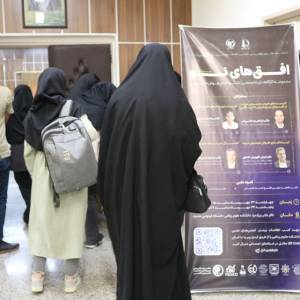 در روزهای ۲۳ و ۲۴ مهرماه ۱۴۰۴، در دانشکده علوم ریاضی دانشگاه فردوسی مشهد و با حضور جمعی از استادان، پژوهشگران و دانشجویان علاقهمند برگزار شد. این رویداد تخصصی با همکاری دفتر توسعه همکاریهای...
در روزهای ۲۳ و ۲۴ مهرماه ۱۴۰۴، در دانشکده علوم ریاضی دانشگاه فردوسی مشهد و با حضور جمعی از استادان، پژوهشگران و دانشجویان علاقهمند برگزار شد. این رویداد تخصصی با همکاری دفتر توسعه همکاریهای...
🌹 مراسم استقبال از دانشجویان نو ورود در دانشکده علوم ریاضی دانشگاه فردوسی مشهد
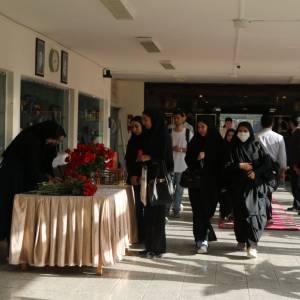 صبح شنبه ۲۶ مهرماه دانشجویان نو ورود دانشکده علوم ریاضی با عبور از فرش قرمز ورودی دانشکده، با دریافت گلی قرمز مورد استقبال هیأت رئیسه و تعدادی از اعضای هیأت علمی دانشکده قرار گرفتند تا دوران تحصیلی...
صبح شنبه ۲۶ مهرماه دانشجویان نو ورود دانشکده علوم ریاضی با عبور از فرش قرمز ورودی دانشکده، با دریافت گلی قرمز مورد استقبال هیأت رئیسه و تعدادی از اعضای هیأت علمی دانشکده قرار گرفتند تا دوران تحصیلی...
انتصاب آقای دکتر جلالالدین نصیری به عنوان مسئول شاخه انجمن ملی هوش مصنوعی ایران در استان خراسان رضوی
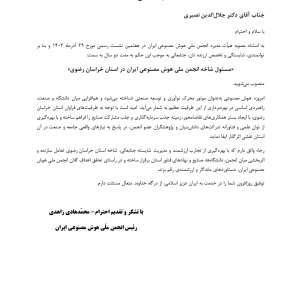 به گزارش روابط عمومی، طی حکمی از سوی آقای محمدهادی زاهدی، رئیس انجمن ملی هوش مصنوعی ایران، دکتر جلالالدین نصیری به عنوان مسئول شاخه انجمن ملی هوش مصنوعی ایران در استان خراسان رضوی منصوب شد . این...
به گزارش روابط عمومی، طی حکمی از سوی آقای محمدهادی زاهدی، رئیس انجمن ملی هوش مصنوعی ایران، دکتر جلالالدین نصیری به عنوان مسئول شاخه انجمن ملی هوش مصنوعی ایران در استان خراسان رضوی منصوب شد . این...
برگزاری نکوداشت دکتر محمدرضا رجبزاده مقدم
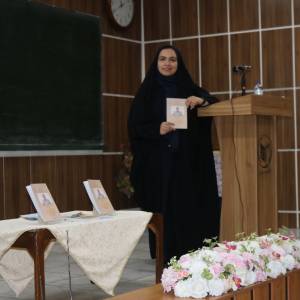 📣 مراسم نکوداشت استاد پیشکسوت و مؤسس دانشکده علوم ریاضی، دکتر محمدرضا رجبزاده مقدم ، روز چهارشنبه ۹ مهر ۱۴۰۴ در سالن اجتماعات این دانشکده با حضور گسترده اساتید، دانشجویان، مسئولان دانشگاه، و...
📣 مراسم نکوداشت استاد پیشکسوت و مؤسس دانشکده علوم ریاضی، دکتر محمدرضا رجبزاده مقدم ، روز چهارشنبه ۹ مهر ۱۴۰۴ در سالن اجتماعات این دانشکده با حضور گسترده اساتید، دانشجویان، مسئولان دانشگاه، و...
نشست معارفه استادان جدید الاستخدام با هیأت رئیسه و اعضای هیأت علمی دانشکده
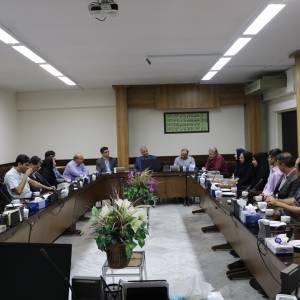 نشست معارفه استادان جدید الاستخدام دانشکده با هیأت رئیسه و اعضای هیأت علمی دانشکده علوم ریاضی با حضور مدیریت دانشکده و همچنین اساتید گروه های مختلف در سالن شورای دانشکده برگزار شد. در این مراسم آقای...
نشست معارفه استادان جدید الاستخدام دانشکده با هیأت رئیسه و اعضای هیأت علمی دانشکده علوم ریاضی با حضور مدیریت دانشکده و همچنین اساتید گروه های مختلف در سالن شورای دانشکده برگزار شد. در این مراسم آقای...





